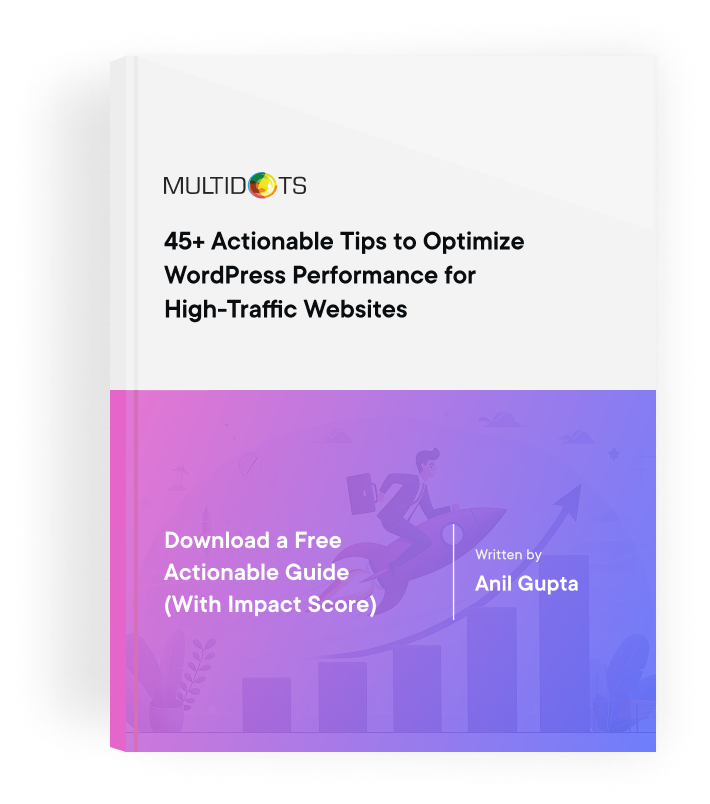The Future of WordPress and HubSpot Content Hub
Explore the evolving landscape of WordPress and HubSpot Content Hub to prepare for future content management trends

Table of Contents
Technologies come and go, and so do people's habits change over time. Just look at how we consume content these days. Compared to the last two decades, we have mostly gone digital. We have so many choices and devices to choose from, and on a daily basis, 1000s of new content pieces on a single subject come out.
Even our shopping habits have changed. The way we shop, the way we pay, and the way we learn a new skill have completely changed over the years.
With that argument in mind, whatever we decide to use today can indeed change in the next decade, five years, three years, or even sooner than that. Rapid growth in various online technologies and everyone having AI assistants in all key jobs means that we need to make decisions that stay relevant for years to come.
Again, when it comes to building your online presence, we have countless reputable products, but it just so happens that one product grows exponentially while the other may stagnate and die before you know it.
WordPress has enjoyed rapid growth in both Enterprise online businesses and small-size businesses and publications. While HubSpot, on the other hand, is a favourite because of its close integration with its CRM, email marketing tools, and more.
Choosing between these two platforms to build your online presence isn’t a wrong decision in the present. In this article, we will discuss the future implications and the outlook for both platforms.
Brief History of WordPress
Who launched it? Matt Mullenweg and Mike Little released WordPress in 2003 as an open-source platform aimed at democratizing publishing. WordPress was a fork of b2/cafelog. The duo recognized a gap in the market for an easy-to-use, customizable, and scalable content management system (CMS) to create blogs.
What gap did it fill? At the time, most web publishing tools were either too complex for average users or too limited for serious developers. WordPress filled this void by providing a robust, flexible platform that could be freely modified and extended.
Why is it open source? WordPress's open-source and free nature was a deliberate choice to foster community-driven development. By allowing anyone to contribute to its codebase, WordPress could rapidly evolve and adapt to the changing needs of web developers and users.
This community-centric approach not only accelerated innovation but also ensured that WordPress remained accessible, relevant, and, most importantly, a Democracy.
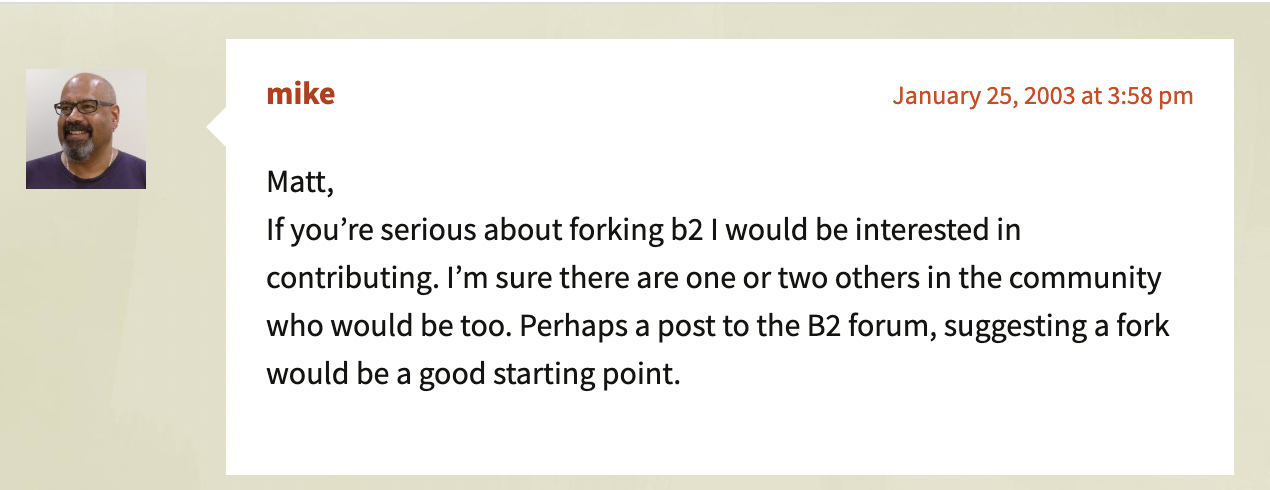
Brief History of HubSpot Content Hub (formerly HubSpot CMS)
Who launched it? HubSpot Content Hub, originally known as HubSpot CMS, was introduced in 2018 as part of HubSpot’s comprehensive suite of marketing tools. HubSpot, founded by Brian Halligan and Dharmesh Shah in 2006, initially focused on providing inbound marketing solutions.
The launch of HubSpot Content Hub marked the company’s foray into the CMS market, aiming to offer an integrated platform that combines content management with robust marketing and CRM capabilities.
What gap did it fill? The need for HubSpot Content Hub arose from the growing demand for a unified system that could manage both website content and marketing efforts. Traditional CMS platforms often require extensive integration with third-party marketing tools, leading to fragmented data and inefficiencies.
HubSpot Content Hub sought to address this gap by providing an integrated experience where content creation, marketing, and customer relationship management were all accessible through a single platform.
Current Usage of WordPress
WordPress’s versatility makes it suitable for a wide range of websites, from personal blogs and portfolios to e-commerce sites and large-scale enterprise solutions. According to W3techs, WordPress powers over 43.4% of all websites on the internet, a testament to its widespread adoption and reliability. The WordPress ecosystem is vast, encompassing over 30,000 themes and over 70,000 active plugins that extend its functionality in countless ways.
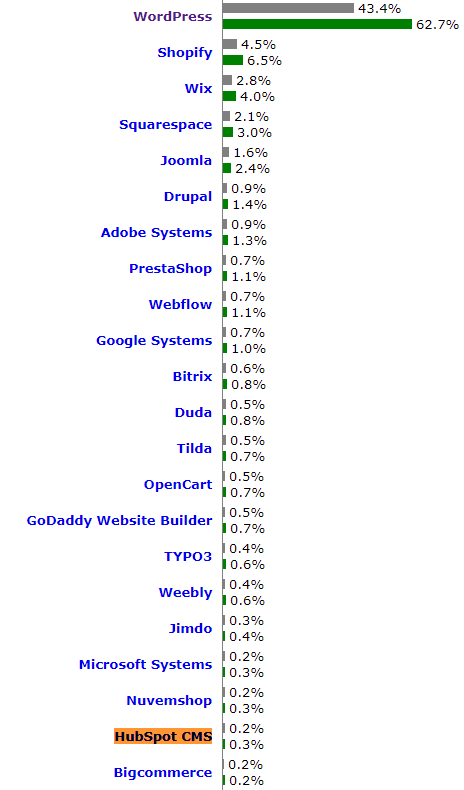
Contributors to WordPress include a global community of developers, marketers, content creators, speakers, trainers, designers, translators, and enthusiasts who continuously improve the platform.
This community-driven development model ensures that WordPress stays ahead of technological trends and user needs. Moreover, major releases and updates are managed by a core team, but input and contributions from volunteers worldwide play a crucial role in shaping the platform's future.
Current Usage of HubSpot Content Hub
HubSpot Content Hub is primarily used for business websites that benefit from its tight integration with marketing and sales tools. It is favoured by companies looking for a streamlined approach to managing their digital presence, marketing campaigns, and customer interactions.
Although its market share is much smaller than WordPress's (0.3% vs. 43.4% of WordPress), HubSpot Content Hub is steadily growing, particularly among businesses that prioritize inbound marketing strategies.
The HubSpot Content Hub ecosystem is built around its suite of marketing, sales, and service software, with contributors ranging from HubSpot’s own development team to certified agency partners who help businesses implement and optimize their HubSpot tools.
This ecosystem assures that users have access to experts, but it is more controlled and less diverse than WordPress's open-source nature.
The Future Outlook of WordPress
Is WordPress destined to stay for a long time?
WordPress’s future looks promising, driven by continuous innovation and a thriving community. The introduction of the Gutenberg editor, which allows for block-based content creation, is just one example of how WordPress adapts to modern web development trends.
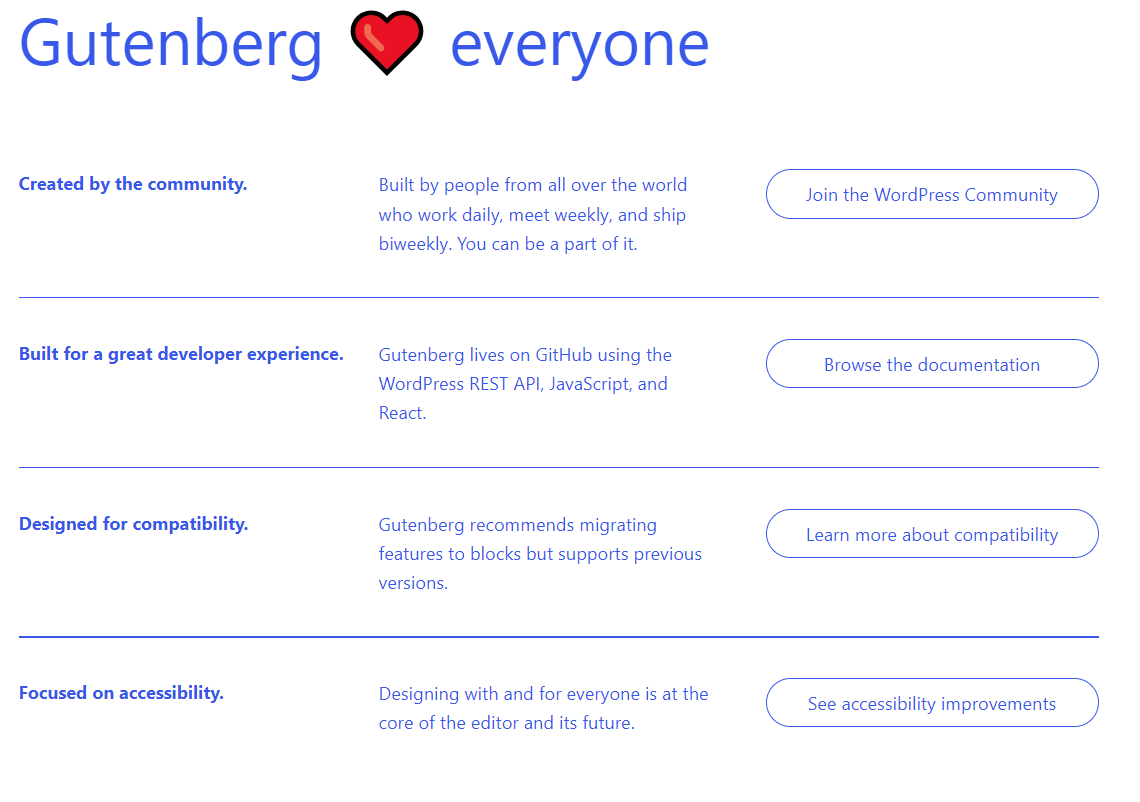
Looking ahead, advancements in code, design, and web hosting are expected to keep WordPress at the forefront of the industry. There are thousands of developers, security researchers, designers and web hosting companies making progress in various areas to make WordPress more user-friendly, performant, secure, and modern.
What are the threats to WordPress?
However, WordPress does face challenges, such as security vulnerabilities and competition from other CMS platforms like Shopify, Wix, and Weebly. Despite these threats, the platform's adaptability and strong community support are likely to sustain its growth.
Being a widely used CMS and being open source, it is logical that WordPress is the most targeted CMS by bad actors. But there are a lot of ways to remedy the security threats.
Can I Use New Tech with WordPress?
One of WordPress's most compelling features is its adaptability. As a platform, it continuously evolves to incorporate the latest technological advancements.
Advancement in Code - WordPress remains at the forefront of web development by embracing modern coding standards and technologies. The platform supports the latest versions of PHP, enhancing performance, security, and functionality.
The introduction of the REST API has revolutionized how developers interact with WordPress, enabling the creation of headless CMS setups and integration with various web and mobile applications. This flexibility allows developers to use frameworks like React, Vue.js, and Angular to build dynamic, interactive front-ends while using WordPress as the content management backbone.
Advancement in Design - WordPress's design capabilities have significantly advanced. The introduction of the Gutenberg block editor represents a shift towards a more intuitive and flexible design approach.
Design frameworks such as Bootstrap and Foundation are widely supported in WordPress. These frameworks enable theme developers to build responsive, mobile-first WordPress themes. These frameworks provide a robust foundation of CSS and JavaScript components.
The use of advanced CSS techniques has become integral to WordPress design. CSS Grid and Flexbox offer powerful layout capabilities, allowing designers to create complex and responsive grid systems without relying heavily on external frameworks. Custom properties (CSS variables) and pre-processors like Sass and LESS enhance the efficiency and maintainability of stylesheets.
WordPress themes are increasingly incorporating these modern design frameworks and CSS capabilities to deliver sophisticated and responsive designs.
Advancement in WordPress Hosting - Web hosting for WordPress has seen substantial improvements, driven by advancements in server technology and cloud computing, both in terms of hardware and software.
Managed WordPress hosting services, such as WP Engine, Kinsta, and SiteGround, offer optimized environments tailored specifically for WordPress. The rise of cloud hosting solutions from providers like Amazon Web Services (AWS) and Google Cloud Platform (GCP) allows for unprecedented scalability and performance.
The web hosting and infrastructure providers have closely partnered to provide WordPress users globally with the best-in-class performance and support.
Automattic introduced WP Cloud, which made enterprise WordPress hosting easier than before. A lot of hosts are partnering up to use WP Cloud’s infrastructure and take advantage of its optimized cloud hosting service. It provides a scalable, high-performance hosting environment that is deeply integrated with WordPress, offering features such as automatic scaling, global CDN, and advanced caching.
No matter how large your website becomes, there are always solutions available for running WordPress flawlessly.

Use of AI in WordPress
Many WordPress companies are also readily adopting AI and offering solutions to their users, ranging from using AI to build entire websites to adding support agents, improving SEO, and writing web copy and content.
AI-powered plugins and tools can automate routine tasks, provide advanced analytics, and improve content creation. For example, AI-driven chatbots can enhance customer service by providing instant responses to common queries.
Tools like Akismet use AI to combat spam effectively, and advanced SEO plugins leverage AI to optimize content for search engines.
How Does WordPress Economy Work?
The WordPress economy is robust worth millions if not billions of dollars, with a thriving market for plugins, themes, web hosting, and professional services. This ecosystem attracts new talented developers, designers, and entrepreneurs globally.
The WordPress ecosystem extends far beyond the core software itself. It encompasses a wide range of businesses and professionals who contribute to and benefit from the platform. Several key sectors drive this vibrant economy:
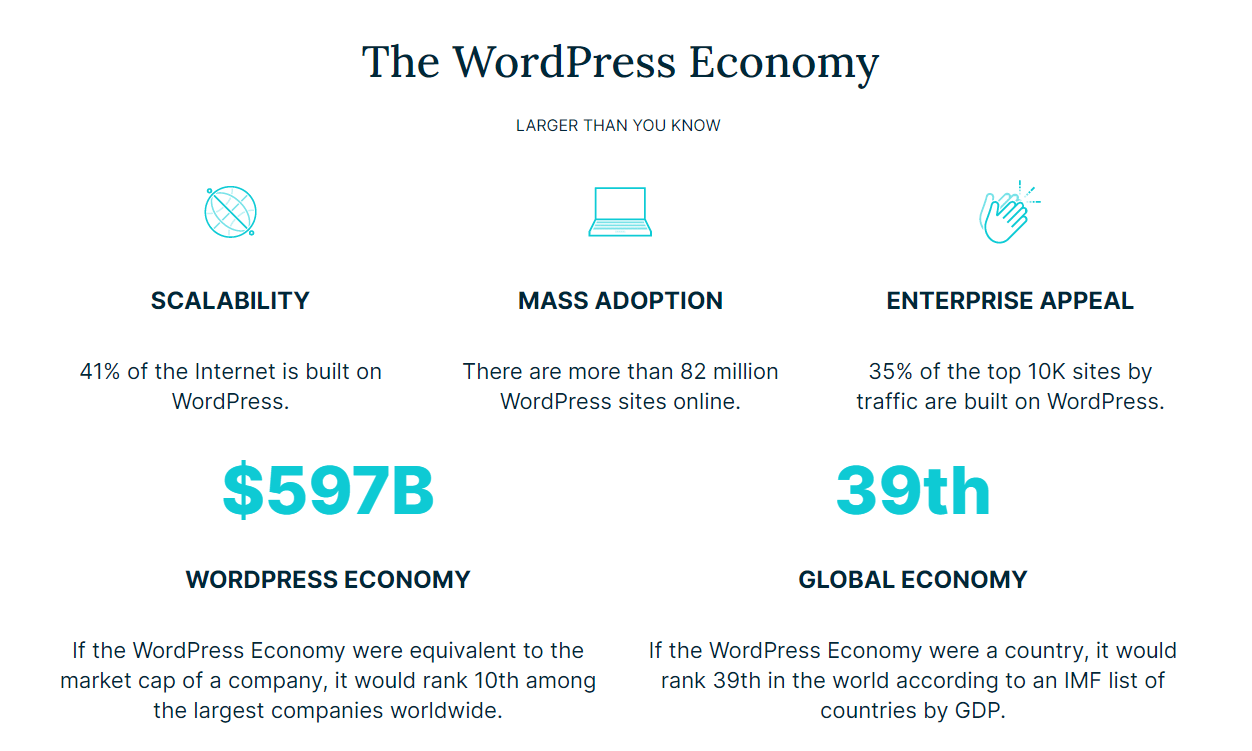
Plugin and Theme Businesses - One of the most significant aspects of the WordPress economy is the plugin and theme business. Developers create plugins to add specific functionalities to WordPress sites, ranging from SEO tools to e-commerce solutions.
The official WordPress Plugin Directory lists over 70,000 free plugins, with many more available for purchase through marketplaces like CodeCanyon and independent developers’ websites. Several WordPress companies generate millions of dollars in revenue each year by selling plugins, extensions, and themes.
Similarly, themes offer design templates that users can customize to fit their brand, with marketplaces like ThemeForest providing thousands of options.
Web Hosting Businesses - Since WordPress is self-hosted, there is a huge demand for hosting, and countless companies offer it at varying price points.
According to Verified Market Reports, the WordPress web hosting market size is valued at $108.6 billion and is projected to be $395.3 billion by 2030.
Web Agency Businesses - Web agencies specializing in WordPress development and design play a crucial role in the ecosystem. These agencies offer services ranging from custom theme and plugin development to complete website design and maintenance.
Some top-tier WordPress agencies make millions in revenue, and a WordPress VIP agency means that the agency is at the top in terms of offering WordPress development services and constantly making great projects.
Designers - Designers contribute to the WordPress economy by creating visually appealing and user-friendly themes, as well as customizing existing themes to meet clients’ needs.
Every product needs a good UX, and designers help create modern, easy-to-navigate layouts for the WordPress dashboard, themes, and website frontends.
Individual WordPress designers, contractors, and freelancers are a big market; the gig market in WordPress is definitely worth millions of dollars, just by looking at how frequently jobs are posted on freelancing platforms.
Marketers and Consultants - With so many businesses operating within the WordPress ecosystem, there is a high demand for marketing roles and consultants. SEO specialists, content marketers, email marketers, social media managers, and others often work within WordPress companies to help them reach their target audience.
Marketers help spread awareness about the real value of a product and service. Since the economy is worth billions of dollars, there is enough share for multiple people operating in the same space to be successful.
Educators - Educators play a vital role in spreading WordPress knowledge and skills. Through online tutorials and courses, in-person workshops, and WordCamps (WordPress conferences), educators help users at all levels—from beginners to advanced developers—improve their WordPress proficiency.
Platforms like Udemy and LinkedIn Learning offer comprehensive courses on various aspects of WordPress, while community-driven events foster collaboration and knowledge sharing.
Support and QA - These roles are both internal-facing and external-facing. Support roles often interact with clients. For example, your plugin users may run into unforeseen errors or compatibility issues and need support. A support engineer who is technical enough to understand how the plugins work can easily provide support and identify bugs.
Meanwhile, QAs are mostly focused on identifying bugs before shipping a product. Both roles are equally important in the WordPress industry.
Contributors and Volunteers - The backbone of WordPress’s continuous improvement is its contributors and volunteers.
These individuals and organizations donate their time and expertise to enhance the platform. They contribute to core development, translate WordPress into different languages, organize community events, and create educational resources. This collaborative effort ensures that WordPress evolves in line with user needs and technological advancements.
With the introduction of Five For the Future - the number of contributors having full time roles within WordPress companies ramped up and hence greatly increased the development of each WordPress version.
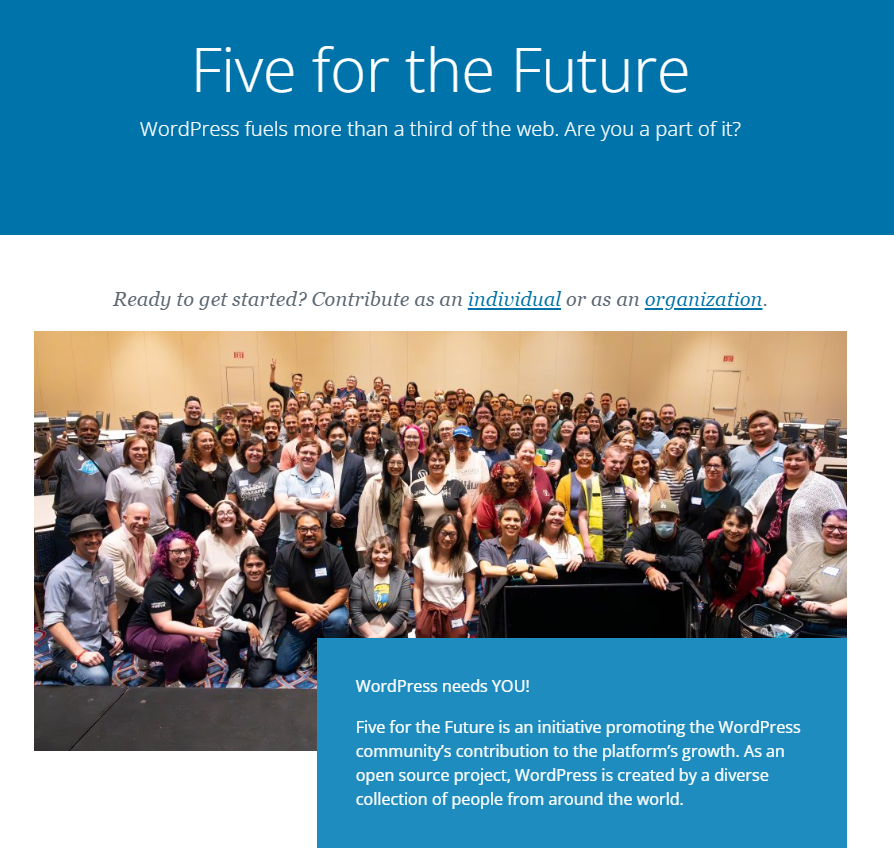
The Future Outlook of HubSpot
Will HubSpot Continue to Thrive and Stay Relevant?
HubSpot’s future also appears bright, particularly in the context of integrated marketing and CRM solutions. As businesses continue to seek cohesive systems that unify their digital operations, HubSpot Content Hub is well-positioned to meet these demands.
The platform is expected to evolve with advancements in AI, marketing automation, and customer data integration, enhancing its value proposition for users.
Nevertheless, HubSpot faces competition from both standalone CMS platforms like WordPress and other integrated marketing solutions. To stay relevant, HubSpot will need to innovate and expand its ecosystem continuously or go extinct.
The HubSpot economy includes development and design agencies, educators, freelancers, marketers, and consultants, all of whom contribute to its growth and adaptation.
However, it is a no-brainer to say that catching up to WordPress can take decades or many years, to say the least. The economy and ecosystem are not nearly as vast as WordPress's.
How Does HubSpot Economy Work?
While different from the open-source WordPress ecosystem, the HubSpot economy is robust and thriving in its own right. While the number of agencies, people, and budgets may not be at the same level as WordPressers', and there may not be many diverse opportunities, the HubSpot platform has built an economy around itself.
HubSpot’s integrated suite of marketing, sales, and service tools has fostered a diverse community of professionals and businesses that contribute to and benefit from the platform. Here’s an overview of the key sectors driving the HubSpot economy:
Development and Design Agencies: Just like WordPress agencies, there are development and design agencies that specialize in the HubSpot platform.
These agencies specialize in creating custom websites, landing pages, and marketing assets that leverage HubSpot’s CMS and marketing tools. By utilizing HubSpot’s design manager, developers, and designers can build responsive, optimized websites that integrate seamlessly with HubSpot’s CRM and marketing automation features.
HubSpot dev and design agencies sign lucrative contracts with other companies and individuals where they help in building online presence, sales funnels, and more with the HubSpot platform.
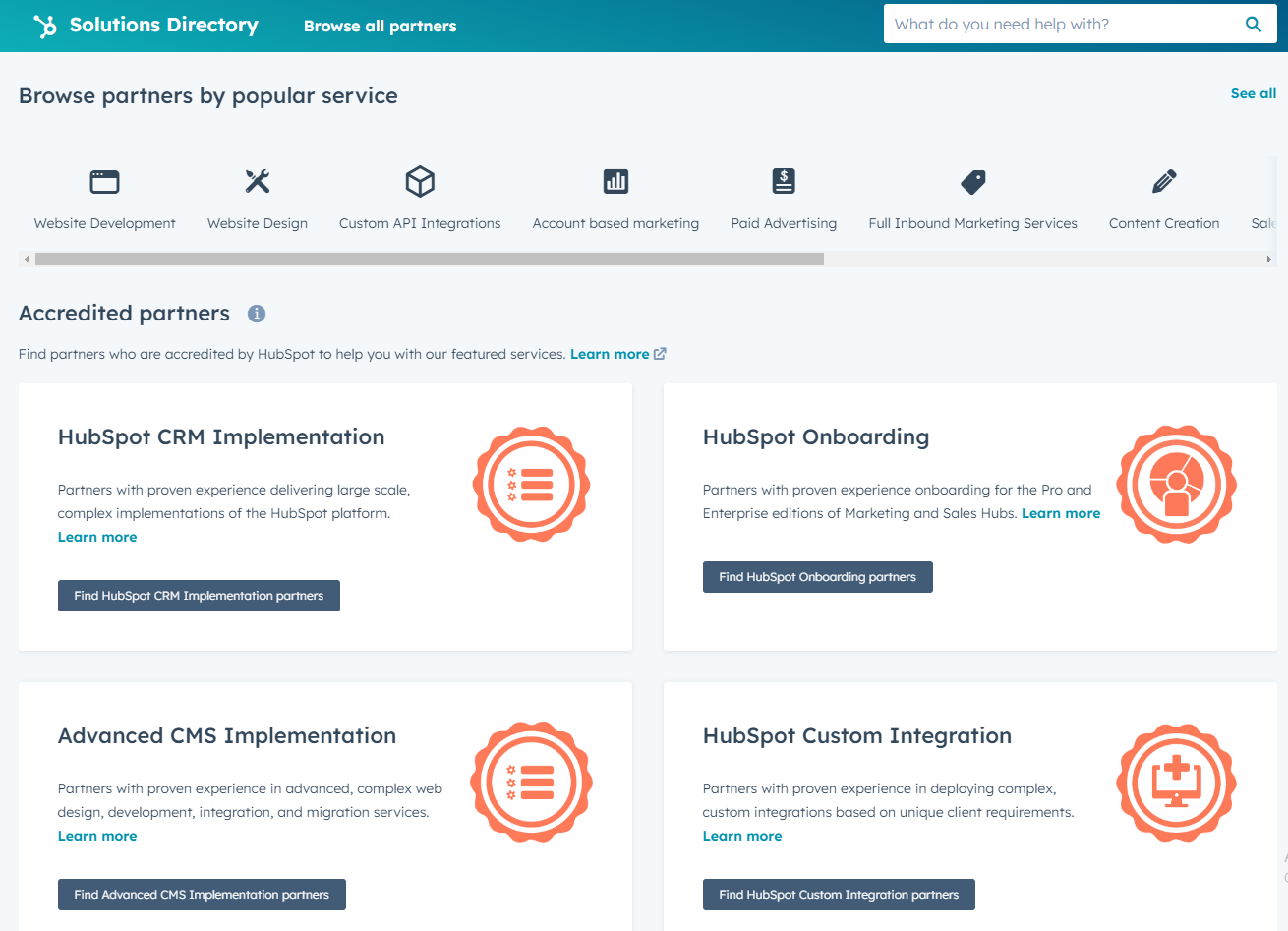
Educators: Educators are vital to the growth and success of the HubSpot platform. Through HubSpot Academy, a free online training platform, HubSpot offers certification courses on various aspects of inbound marketing, sales, and service.
These courses help users—from beginners to advanced professionals—acquire the skills needed to effectively use HubSpot tools.
Independent educators and training organizations offer workshops, webinars, and consulting services to help businesses and individuals stay up-to-date with best practices and new features.
Freelancers: Freelancers are an essential part of any online economy; they provide flexible and specialized services to businesses of all sizes.
Freelance marketers, developers, designers, and content creators often work on a project basis, helping companies with specific needs such as setting up HubSpot campaigns, developing custom modules, creating engaging content, or optimizing SEO.
The flexibility and expertise offered by freelancers make them valuable assets to businesses that want to use HubSpot Content Hub.
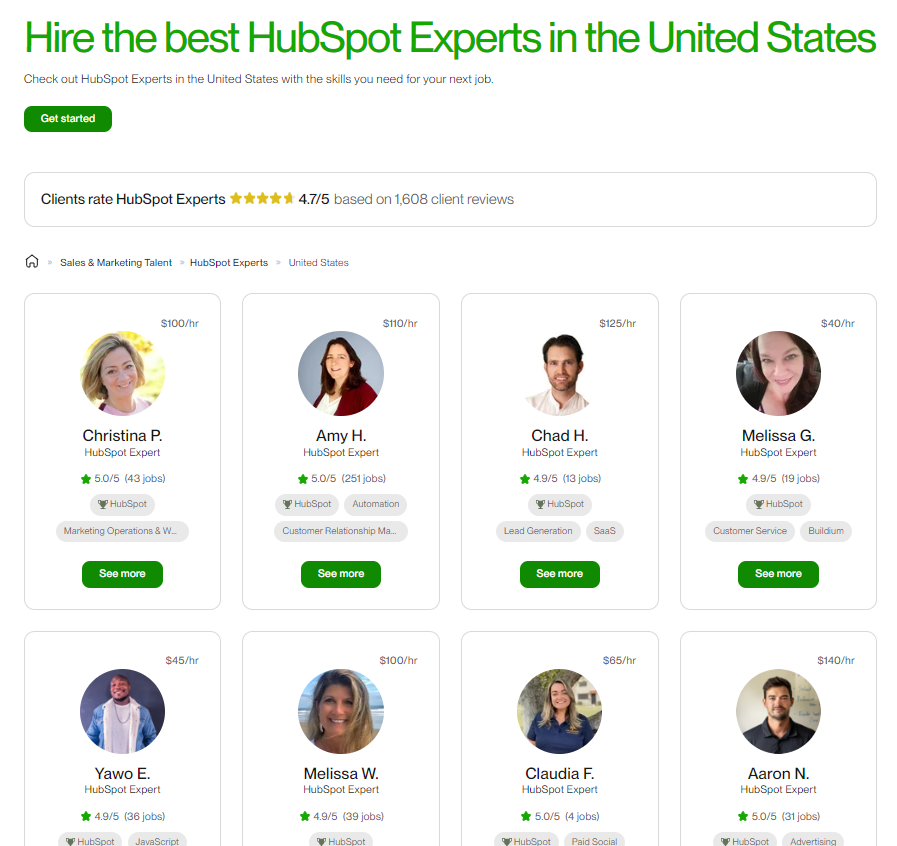
Marketers and Consultants: Marketers and consultants are at the core of the HubSpot ecosystem, helping businesses implement and optimize their inbound marketing strategies.
These professionals use HubSpot’s comprehensive suite of tools to create and manage campaigns, analyze performance, and drive growth.
From content marketing and SEO to social media and email marketing, HubSpot consultants provide expert guidance to ensure businesses achieve their marketing objectives. Many of these consultants hold HubSpot certifications, demonstrating their proficiency and commitment to best practices.
Sales Professionals: Sales professionals benefit from HubSpot’s integrated CRM and sales tools, which streamline the sales process and improve customer relationship management.
Sales consultants and trainers work with businesses to implement HubSpot’s sales software, helping them track leads, manage pipelines, and close deals more effectively. These professionals provide training on using HubSpot’s sales features, such as email templates, meeting scheduling, and sales automation, enabling sales teams to work more efficiently and achieve better results.
Support: Support professionals are crucial for ensuring that HubSpot users can effectively utilize the platform and overcome any technical challenges. HubSpot offers robust customer support through various channels, including live chat, email, and phone.
Additionally, the HubSpot Community provides a space for users to ask questions, share knowledge, and find solutions to common issues. Support teams within HubSpot-certified agencies and independent consultants also offer personalized assistance and troubleshooting, helping users maximize the platform’s capabilities.
So, Which One Should You Choose Between WordPress & HubSpot Content Hub?
While both WordPress and HubSpot Content Hub have their merits, WordPress stands out for its flexibility, extensive capabilities, and strong community support.
As technology evolves, WordPress's adaptability and innovative drive make it a more future-proof choice for building a robust online presence. If you're deciding between the two, WordPress is the better investment for a versatile and enduring online platform.
Feel free to schedule a quick call with our migration expert.
Contact Us